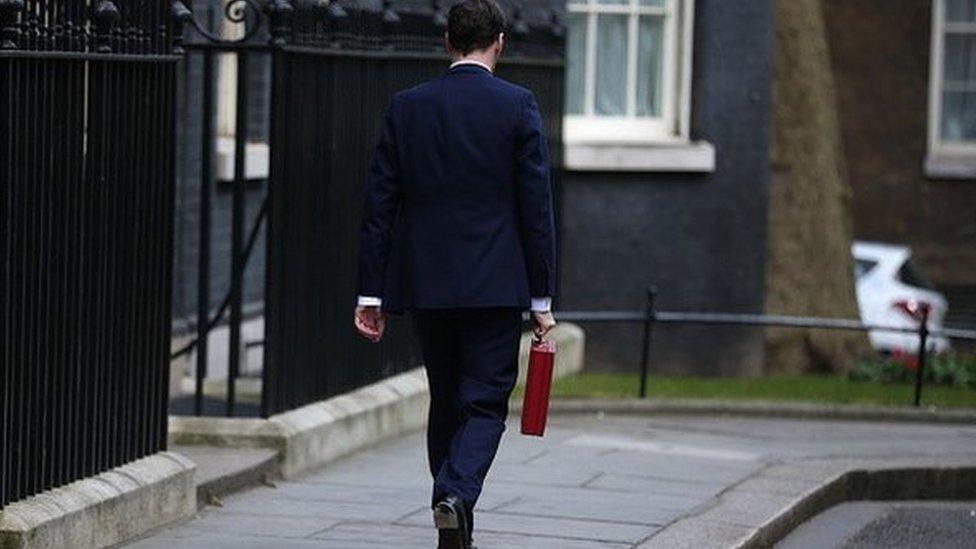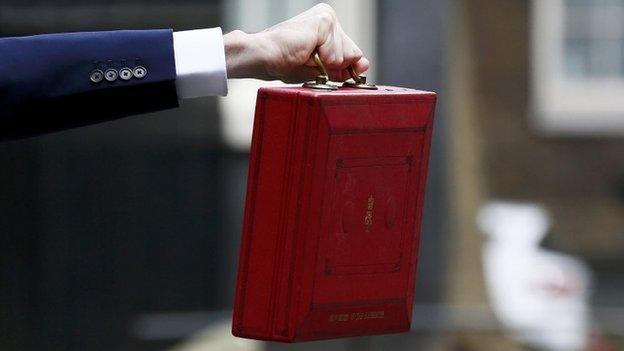Budget 2016: 'Wage growth to slow down', warns IFS
- Published
Budget 2016: 'Disability budget going up' - Osborne
Growth in wages and living standards is set to slow, a think tank has warned, after Chancellor George Osborne revised down forecasts for economic expansion.
The Institute for Fiscal Studies warned if the Budget forecasts were right "we should all be worried".
"This will lead to lower wages and living standards, not just lower tax revenues for the Treasury," it said.
Mr Osborne blamed global factors for the cut, but Labour said his credibility was "completely shot".
Labour also accused him of cutting taxes for the wealthy at the expense of the poor.
The independent forecasting body, the Office for Budget Responsibility (OBR), revised the UK growth forecasts down for the next five years in Wednesday's Budget, and Mr Osborne warned the outlook for the global economy was "markedly weaker" with the UK "not immune" to a slowdown.
The IFS said lower UK productivity was largely to blame for the downgrade.
Another think tank, the Resolution Foundation, warned that the richest households would be the greatest beneficiaries from next year's tax changes.
From April 2017, no one will start paying income tax until they earn £11,500 - up from £11,000 from April 2016. And the threshold for the higher rate of tax will be raised from £43,000 to £45,000.
The Resolution Foundation said that would mean the poorest 20% of households gaining just £10 a year on average, while the richest 20% would gain £225.
Despite the lower-than-expected growth, Mr Osborne said he was still on track to get the UK back in the black by 2020, insisting on BBC Radio 4's Today programme that he would clear the deficit.
'Running out of wriggle room'
But he added the proviso that it would happen "in normal times when the economy is growing".
However, the IFS warned Mr Osborne was "running out of wriggle room" and gave him just a 50% chance of hitting his target of a £10bn surplus on the public finances by 2020.
It also warned that if growth deteriorated further then Mr Osborne would need fresh spending cuts or tax rises to meet his pledge.
"If there was another downgrade in fiscal forecasts of a similar magnitude and the chancellor did wish to remain on course to deliver a budget surplus in 2019-20 then this would surely require more real policy change," said IFS director Paul Johnson.
Mr Johnson also said the chancellor had "managed to shift quite a lot money around" to try and meet his target but he can only "get away with this once".


BBC experts analyse the Budget

In the Budget, Mr Osborne said he would cut spending by a further £3.5bn in the last year of parliament, on top of the cuts announced in November, but did not specify where these would fall.
Mr Osborne said he would also bring forward capital spending, previously due in 2019, and delay tax revenues for the same year to make sure he achieved his budget surplus target.
Austerity
"If we get another downgrade in prospects or prospects for tax receipts which is perfectly possible - it's almost a 50:50 chance that that will happen - if that happens again he won't be able to get away with a similar set of actions next time," said Mr Johnson.
"He will either have to actually impose some real tax increases of some more spending cuts or he'll have to say, 'look I'm just not going to meet my target. This is the last chance, this is the last time he's going to be able to get away with moving things around like this."
Mr Johnson also warned that there would be an additional "year of austerity" after the next election as a result of Mr Osborne's pledge to maintain the surplus.
"The chancellor has added another year of austerity, another year of spending cuts to the end of his plans so even if we get - if we get - to surplus in 2019/20 which is the plan, we'll have to have another year of pain to stay there the following year," Mr Johnson told the BBC's World at One.
- Published17 March 2016

- Published17 March 2016

- Published16 March 2016

- Published11 March 2020

- Published16 March 2016
